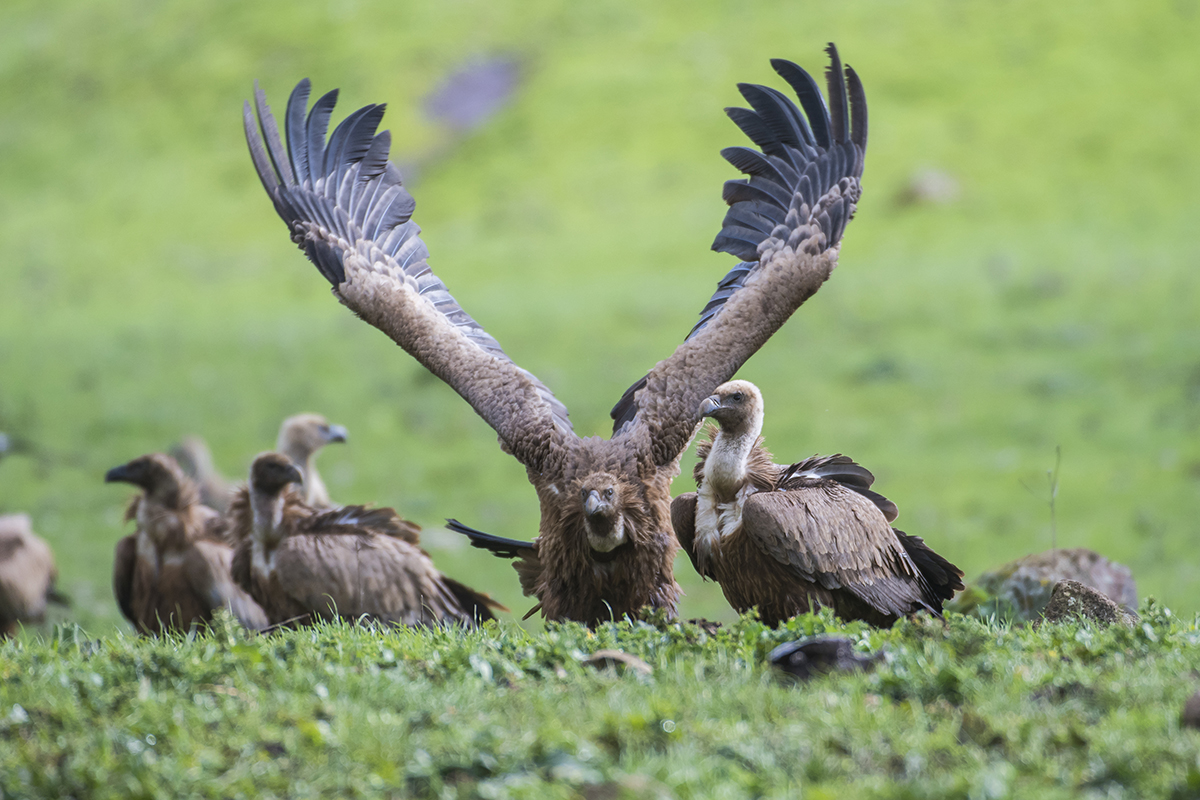
An African vulture individual officially moved to Malaga. Researchers have recently identified Juanita, an adult Rüppell’s Vulture that settled in El Chorro.
The adult Rüppell’s Vulture Juanita moves to Europe
Juanita, a female Rüppell’s Vulture, seems to have settled permanently in El Chorro. Researchers Antonio Román Muñoz, ornithologist and professor of Biology, and Raimundo Real, professor of Zoology, from the University of Malaga (UMA) are leading this study. The research team has managed to identify the bird, capture her momentarily (she has already returned to the wild) and equip her with the latest generation GPS transmitter to track her movements and behaviour. Juanita is an adult vulture at least six years old. Her name honours the technician who has dedicated the most hours to her capture. It has been so difficult that up to 812 Griffon Vultures passed through the trap before finally catching Juanita. Not only did Juanita settle in Malaga, but she already tried to breed by hybridising with a Griffon Vulture.

“She is living sedentarily in Europe,” states Antonio Román Muñoz.
The African Rüppell’s Vulture is on the brink of extinction
The Rüppell’s Vulture (Gyps rueppelli) is an African species whose distribution range is located in the Sahelian and Equatorial areas of the continent. The species resembles our Griffon Vulture (Gyps fulvus), especially the juvenile and immature birds, being slightly smaller in size. The IUCN’s Red List of Threatened Species considers the Rüppell’s Vulture as Critically Endangered, the last category before global extinction. Its declining state is mostly due to the successive and frequent mass poisonings in Africa, which are driving several African vulture species to extinction.
The Rüppell’s Vulture is becoming a common sight in Europe
Even though Rüppell’s Vultures are becoming alarmingly scarce in Africa, surprisingly, they are increasingly seen in Europe, with some calling it Europe’s 5th vulture species and one of the most threatened bird species in Spain. Individuals of this species increasingly mix with juvenile Griffon Vultures wintering in West Africa (Senegal and Gambia, among other places). Between 8,000 and 9,000 individuals cross the Strait of Gibraltar every year, and when European Griffon Vultures start their migration north, some Rüppell’s Vultures join the groups and reach Europe. These are mostly juveniles, and in most cases, they go back to Africa in the autumn. On the other hand, Juanita’s case is extraordinary since she remained in a European breeding colony for more than one season. Through the GPS transmitter, the research team will study whether this female will return to Africa or continue trying to reproduce in Malaga.
It is important to note that reports indicate the presence of a Rüppell’s Vulture living in a Griffon Vulture breeding colony in Sicily for the past couple of years. There are also reports of another individual in Portugal, but the data is scant.
Climate change is a possible reason for the move to Europe
The researchers have also linked the presence of the Rüppell’s Vulture as far north as the Mediterranean Basin to possible effects of climate change as a consequence of the ‘Africanisation’ of climate, where other avian species have recently colonised Spain. However, this is still under evaluation. Contrary to what usually happens, in this case, climate change could be the salvation for this critically endangered species since Spain is a stronghold for vultures, with plenty of carrion and vulture conservation projects in place working to protect and conserve these important birds.
Source: Diario Sur

As the sightings of the African Rüppell’s Vulture continue to grow in Iberia and Europe, we at the Vulture Conservation Foundation (VCF) also intend to monitor the situation by equipping individuals with GPS transmitters to help determine their origin and how long they stay in Europe. We have recently equipped Vouzela with a GPS transmitter, the first individual of the species tagged in Portugal, who has already returned to Africa.



